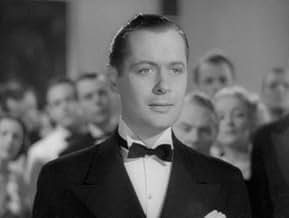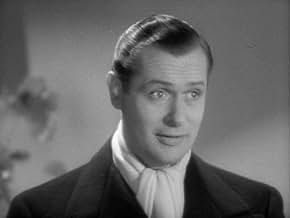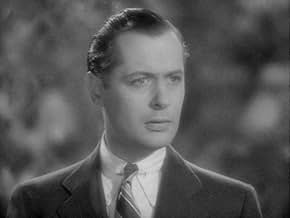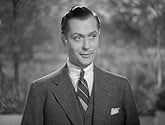IMDb-BEWERTUNG
6,0/10
991
IHRE BEWERTUNG
Füge eine Handlung in deiner Sprache hinzuA society girl tries to reform her playboy husband by making him jealous.A society girl tries to reform her playboy husband by making him jealous.A society girl tries to reform her playboy husband by making him jealous.
- Auszeichnungen
- 3 wins total
Charles Ruggles
- Edgar
- (as Charlie Ruggles)
Joan Fontaine
- Caroline
- (as Joan Burfield)
John David Horsley
- Duffy
- (as David Horsley)
E.J. Babille
- Desk Clerk
- (as E.J. Babiel)
Jean Acker
- Nightclub Extra
- (Nicht genannt)
Gertrude Astor
- Nightclub Extra
- (Nicht genannt)
Clem Beauchamp
- Drunk
- (Nicht genannt)
Brooks Benedict
- Joe Williams - Bar Owner
- (Nicht genannt)
Veda Buckland
- Marcia's Maid
- (Nicht genannt)
Empfohlene Bewertungen
This film is not entirely dismal. Robert Montgomery is light and smooth as the playboy who nails anyone he wants, including the wives of his friends. The long list includes Gail Patrick, who plays Carole Lombard's nasty older high society sister in "My Man Godfrey". In this bizarro world film, she is a banjo playing bar fly. Anyway, before RM and Joan Crawford get married, he is told not to go into her room because she is in bed. Response: "Since when is a lady in bed an object of repugnance?" Joan runs around in sharp designer outfits, and restrains herself from chewing the scenery - much. In short, some snappy dialogue amid the heavy drinking and innuendos. To quote someone clever, "marriage is the death of hope and the birth of despair." BC
There's a word for the character, Sherry Warren, often used in the past, that much better describes him than the most frequently used polite term, womanizer. Robert Montgomery's role in "No More Ladies," may be the best character performance of the worst despicable cad in films. His sweet appearance, persona and laissez faire attitude about relationships, responsibility, love and marriage are revolting to real manhood. He's hedonistic, completely self-centered and selfish. And he's a consummate liar whose off-hand insistences of his honesty show him to be a person with little to no ethics or morality.
After a number of scenes in which Sherry lies to Joan Crawford's Marcia or someone else, Marcia catches him in a direct lie to her. Then when they are together and Marcia asks him about honesty and his other loves, he says, "No lies, you understand. Never have been any. Never will be any. Now do you want an answer?" When Marcia says, "Please," he says, "Yes. I would have told you anyway. I couldn't have lied to you."
With a cast of huge names of the day, "No More Ladies" just covered its budget in box office sales with a small domestic market profit. One has to wonder what many people thought watching such a film in the midst of the Great Depression. Where many films about wealthy and night time partying were uplifting because they had some real comedy and/or involved working people, the entire setting for this film is super wealthy, idle-rich, and most of the people living solely for their individual personal pleasure at the moment. Charles Ruggles' character, Edgar, is a sot, three-sheets to the wind most of the time.
This film is a very talky one, and it has spry dialog that is witty at times, conflicted at times, and very funny on occasion. Joan Crawford plays opposite Montgomery and has top billing by MGM for the female glamor appeal. Besides another leading man of the period in a supporting role - Franchot Tone (who would marry Crawford five months after this film came out), a top supporting cast includes Charles Ruggles, Edna May Oliver, Reginald Denny, Arthur Treacher, and Gail Patrick. It's also the first film appearance of Joan Fontaine at age 17, under the name of Joan Burfield.
Movie buffs may find this movie interesting for its hedonistic portrayal of a rare segment of the population in the mid-1930s, and for the wordy dialog, especially the skewed philosophical remarks at times.
None of the performances are outstanding, and the subject matter of loose, carefree living with no regard for most people isn't very appealing as a theme. So, many people might be put off by it while others will find it quite boring. My six stars are for the cast and writing of the quick exchanges in dialog - not necessarily the screenplay itself.
Here are some favorite lines.
Fanny, "I know - my contemporaries give me a swift pain. So do most old people."
Oliver, "You look exactly as a man wants a grandmother to look." Fanny, "I know - I always have."
Edgar, "He drinks like a fish - like two fishes."
Marcia, "Sherry, you've played around with life so long, you won't know an honest emotion if you saw one."
Sherry, "Marcia wouldn't marry me." Fanny, "Don't be sure. She hasn't got much sense. I sort of counted on you. Now I can't even be sure of you."
Sherry, "I'm sorry. I thought you liked having me around more or less." Marcia, "I do. More, or less. Either one or the other. There now you've got it." Sherry, "You, you, you aren't asking me to... to marry you by any...no thank you ... I hate olives."
Sherry, "Why don't people trust me?" Fanny, "Maybe it's because they know you."
Fanny, "Any crook worthy of the name has a getaway arranged."
Marcia, "Are all fighters affectionate?" Sherry, "I don't, as a rule, neck them." Marcia, "What a lot you miss."
Fanny, "Good heavens, Casabianca. The ship's sinking."
Marcia, on the phone with Sherry, "What? Fanny says you're nothing to boast about in any circle."
Sherry, checking his watch, "Maybe I'm a little slow." Theresa, "That isn't what I heard about you."
Edgar, "Where do you suppose that girl went? Maybe she's been kidnapped. I wouldn't put it past her."
Fanny, "She swiped your car, kidnapped your prize-fighter, and disappeared into the night - I feel better now."
Edgar, pointing to a Pekingese dog a woman is carrying, "Do you think it'll be safe with that little hors d'oeuvre going in the same car with Rover? Heh, heh, he hasn't had his dinner yet, you know."
After a number of scenes in which Sherry lies to Joan Crawford's Marcia or someone else, Marcia catches him in a direct lie to her. Then when they are together and Marcia asks him about honesty and his other loves, he says, "No lies, you understand. Never have been any. Never will be any. Now do you want an answer?" When Marcia says, "Please," he says, "Yes. I would have told you anyway. I couldn't have lied to you."
With a cast of huge names of the day, "No More Ladies" just covered its budget in box office sales with a small domestic market profit. One has to wonder what many people thought watching such a film in the midst of the Great Depression. Where many films about wealthy and night time partying were uplifting because they had some real comedy and/or involved working people, the entire setting for this film is super wealthy, idle-rich, and most of the people living solely for their individual personal pleasure at the moment. Charles Ruggles' character, Edgar, is a sot, three-sheets to the wind most of the time.
This film is a very talky one, and it has spry dialog that is witty at times, conflicted at times, and very funny on occasion. Joan Crawford plays opposite Montgomery and has top billing by MGM for the female glamor appeal. Besides another leading man of the period in a supporting role - Franchot Tone (who would marry Crawford five months after this film came out), a top supporting cast includes Charles Ruggles, Edna May Oliver, Reginald Denny, Arthur Treacher, and Gail Patrick. It's also the first film appearance of Joan Fontaine at age 17, under the name of Joan Burfield.
Movie buffs may find this movie interesting for its hedonistic portrayal of a rare segment of the population in the mid-1930s, and for the wordy dialog, especially the skewed philosophical remarks at times.
None of the performances are outstanding, and the subject matter of loose, carefree living with no regard for most people isn't very appealing as a theme. So, many people might be put off by it while others will find it quite boring. My six stars are for the cast and writing of the quick exchanges in dialog - not necessarily the screenplay itself.
Here are some favorite lines.
Fanny, "I know - my contemporaries give me a swift pain. So do most old people."
Oliver, "You look exactly as a man wants a grandmother to look." Fanny, "I know - I always have."
Edgar, "He drinks like a fish - like two fishes."
Marcia, "Sherry, you've played around with life so long, you won't know an honest emotion if you saw one."
Sherry, "Marcia wouldn't marry me." Fanny, "Don't be sure. She hasn't got much sense. I sort of counted on you. Now I can't even be sure of you."
Sherry, "I'm sorry. I thought you liked having me around more or less." Marcia, "I do. More, or less. Either one or the other. There now you've got it." Sherry, "You, you, you aren't asking me to... to marry you by any...no thank you ... I hate olives."
Sherry, "Why don't people trust me?" Fanny, "Maybe it's because they know you."
Fanny, "Any crook worthy of the name has a getaway arranged."
Marcia, "Are all fighters affectionate?" Sherry, "I don't, as a rule, neck them." Marcia, "What a lot you miss."
Fanny, "Good heavens, Casabianca. The ship's sinking."
Marcia, on the phone with Sherry, "What? Fanny says you're nothing to boast about in any circle."
Sherry, checking his watch, "Maybe I'm a little slow." Theresa, "That isn't what I heard about you."
Edgar, "Where do you suppose that girl went? Maybe she's been kidnapped. I wouldn't put it past her."
Fanny, "She swiped your car, kidnapped your prize-fighter, and disappeared into the night - I feel better now."
Edgar, pointing to a Pekingese dog a woman is carrying, "Do you think it'll be safe with that little hors d'oeuvre going in the same car with Rover? Heh, heh, he hasn't had his dinner yet, you know."
In the past 24 hours, I watched two 1930s comedies -- MERRILY WE LIVE and NO MORE LADIES.
IDMB users seemed to like MWL far more than I did. Many of the actors brought little to their roles in that film, and there's not a snappy bit of dialogue in the whole picture.
NML, on the other hand, is very witty, very well-acted, and quite entertaining. Yes, it might have been even better with someone other than Joan Crawford in the female lead, but Robert Montgomery is very strong and this was the most enjoyable work I'd ever seen Edna May Oliver deliver.
And I don't think, as one reviewer suggested, the Code impacted this movie very much -- in fact, it comes as being quite Pre-Code in nature. If you didn't know when it was made, one might easily guess it was pre-, not post-, code.
In short, not a classic, but quite snappy and entertaining and well worth watching.
IDMB users seemed to like MWL far more than I did. Many of the actors brought little to their roles in that film, and there's not a snappy bit of dialogue in the whole picture.
NML, on the other hand, is very witty, very well-acted, and quite entertaining. Yes, it might have been even better with someone other than Joan Crawford in the female lead, but Robert Montgomery is very strong and this was the most enjoyable work I'd ever seen Edna May Oliver deliver.
And I don't think, as one reviewer suggested, the Code impacted this movie very much -- in fact, it comes as being quite Pre-Code in nature. If you didn't know when it was made, one might easily guess it was pre-, not post-, code.
In short, not a classic, but quite snappy and entertaining and well worth watching.
This is a film that came between two of Joan Crawford's best work in the movies, while still employed by MGM, "Grand Hotel" and "The Women". This is a film seldom seen these days. Thanks to TCM we had the opportunity to watch it.
In fact, "No More Ladies", is an adaptation of a stage play. Even though George Cukor was not given credit for helping Edward Griffith with the direction, the adaptation can't circumvent the fact one is watching a theatrical play the way it unfolds on the screen. Donald Ogden Stewart, a talented screen writer is among the several people that collaborated with the script. The problem with the screen play is that if feels too artificial.
The film is worth a look because of the star turn by Edna May Oliver, who as Fanny, steals the picture from its principals. Although not a radiant beauty, Ms. Oliver makes her presence known from the start because of her wit and the lines she delivers with absolute conviction and flair. As Neil Doyle has commented in this page, Ms. Oliver is the best thing in the film.
Joan Crawford is Marcia, the rich girl in love with Sherry, a man who has an eye for beautiful women and who doesn't mind straying. Ms. Crawford, dressed by Adrian, shows she had a way to show herself at an advantage in front of the camera, who loved her features, but somehow she comes across as too remote and she doesn't seem to have too much chemistry with her co-star.
Robert Montgomery plays Sherry, the man who can't keep away from women, as is the case when he meets Theresa, an attractive girl about town who couldn't care less if he belongs to another. Mr. Montgomery was an actor well suited for this type of comedy. He is always effective in the characters he portrays in film.
The supporting cast is interesting. Gail Patrick is perfect as Theresa, a role she was always good at portraying. Franchot Tone and especially Charles Ruggles, are seen at their best. This film marked the debut of Joan Fontaine, billed as Joan Burfield, in a small part.
"No More Ladies" is a curiosity film made more enjoyable by the presence of Edna May Oliver.
In fact, "No More Ladies", is an adaptation of a stage play. Even though George Cukor was not given credit for helping Edward Griffith with the direction, the adaptation can't circumvent the fact one is watching a theatrical play the way it unfolds on the screen. Donald Ogden Stewart, a talented screen writer is among the several people that collaborated with the script. The problem with the screen play is that if feels too artificial.
The film is worth a look because of the star turn by Edna May Oliver, who as Fanny, steals the picture from its principals. Although not a radiant beauty, Ms. Oliver makes her presence known from the start because of her wit and the lines she delivers with absolute conviction and flair. As Neil Doyle has commented in this page, Ms. Oliver is the best thing in the film.
Joan Crawford is Marcia, the rich girl in love with Sherry, a man who has an eye for beautiful women and who doesn't mind straying. Ms. Crawford, dressed by Adrian, shows she had a way to show herself at an advantage in front of the camera, who loved her features, but somehow she comes across as too remote and she doesn't seem to have too much chemistry with her co-star.
Robert Montgomery plays Sherry, the man who can't keep away from women, as is the case when he meets Theresa, an attractive girl about town who couldn't care less if he belongs to another. Mr. Montgomery was an actor well suited for this type of comedy. He is always effective in the characters he portrays in film.
The supporting cast is interesting. Gail Patrick is perfect as Theresa, a role she was always good at portraying. Franchot Tone and especially Charles Ruggles, are seen at their best. This film marked the debut of Joan Fontaine, billed as Joan Burfield, in a small part.
"No More Ladies" is a curiosity film made more enjoyable by the presence of Edna May Oliver.
Broadway must have had dozens of these drawing room comedies featuring rich, well-dressed people speaking snappily to one another. I say "must have" because Hollywood seems to have adapted all of them. "No More Ladies" is yet another one, and for my money, it's pretty routine. Joan Crawford is a rich girl in love with a cad, played by Robert Montgomery. They marry and he's still a cad. In fact, instead of going to their country house one weekend, he delays his trip and has a dalliance with a woman named Therese. He admits this when he finally shows up in the country. He has little choice when he learns that his alibi, Charlie Ruggles, is actually at the country home. In retaliation, Crawford invites an old beau and a couple of ex-girlfriends to a huge party.
The dialogue is witty, the clothes are glamorous, the apartment and house are sumptuous, and the performances are very good. Montgomery was always perfect in these roles, and Crawford is attractive and spars with Montgomery well. Edna Mae Oliver is superb as always. Charles Ruggles plays a somewhat annoying drunk. Gail Patrick, who became Gail Patrick Jackson and produced "Perry Mason," having married Erle Stanley Gardner's agent, does very well as the pretty other woman.
This is one of those films where one asks, so why wasn't I crazy about it? The only reason is that there was a sameness about it and nothing really to differentiate it - including the cast - from all the other light, romantic comedies. It's no wonder that Robert Montgomery fought so hard to make "Night Must Fall." He was incredibly bored with these roles. It's understandable.
The dialogue is witty, the clothes are glamorous, the apartment and house are sumptuous, and the performances are very good. Montgomery was always perfect in these roles, and Crawford is attractive and spars with Montgomery well. Edna Mae Oliver is superb as always. Charles Ruggles plays a somewhat annoying drunk. Gail Patrick, who became Gail Patrick Jackson and produced "Perry Mason," having married Erle Stanley Gardner's agent, does very well as the pretty other woman.
This is one of those films where one asks, so why wasn't I crazy about it? The only reason is that there was a sameness about it and nothing really to differentiate it - including the cast - from all the other light, romantic comedies. It's no wonder that Robert Montgomery fought so hard to make "Night Must Fall." He was incredibly bored with these roles. It's understandable.
Wusstest du schon
- WissenswertesBig-screen debut of Joan Fontaine (listed as Joan Burfield).
- PatzerWhen Sherry and Fanny are talking in front of the fireplace, from one scene to the next his position changes back and forth. First he's standing and facing Fanny, who is sitting as they talk; then he is to her side, kneeling on a sofa bench with his back to her and leaning on the fireplace hearth. Then he is back opposite her, standing and facing her as they talk; then he's back kneeling on the sofa and leaning on the hearth. Then he's once again standing and facing Fanny.
- Zitate
Oliver Allen: Look here, you can't go up there--she might be in bed!
Sheridan 'Sherry': Since when has a lady in bed been an object of repugnance?
- VerbindungenFeatured in Joan Crawford: The Ultimate Movie Star (2002)
- SoundtracksAll I Do Is Dream Of You
(1934) (uncredited)
Music by Nacio Herb Brown
Lyrics by Arthur Freed
Played on banjo by Arthur Treacher and
Sung by Gail Patrick at the party
Top-Auswahl
Melde dich zum Bewerten an und greife auf die Watchlist für personalisierte Empfehlungen zu.
Details
- Erscheinungsdatum
- Herkunftsland
- Sprache
- Auch bekannt als
- No More Ladies
- Drehorte
- Produktionsfirma
- Weitere beteiligte Unternehmen bei IMDbPro anzeigen
Box Office
- Budget
- 765.000 $ (geschätzt)
- Laufzeit
- 1 Std. 20 Min.(80 min)
- Farbe
- Seitenverhältnis
- 1.37 : 1
Zu dieser Seite beitragen
Bearbeitung vorschlagen oder fehlenden Inhalt hinzufügen



































